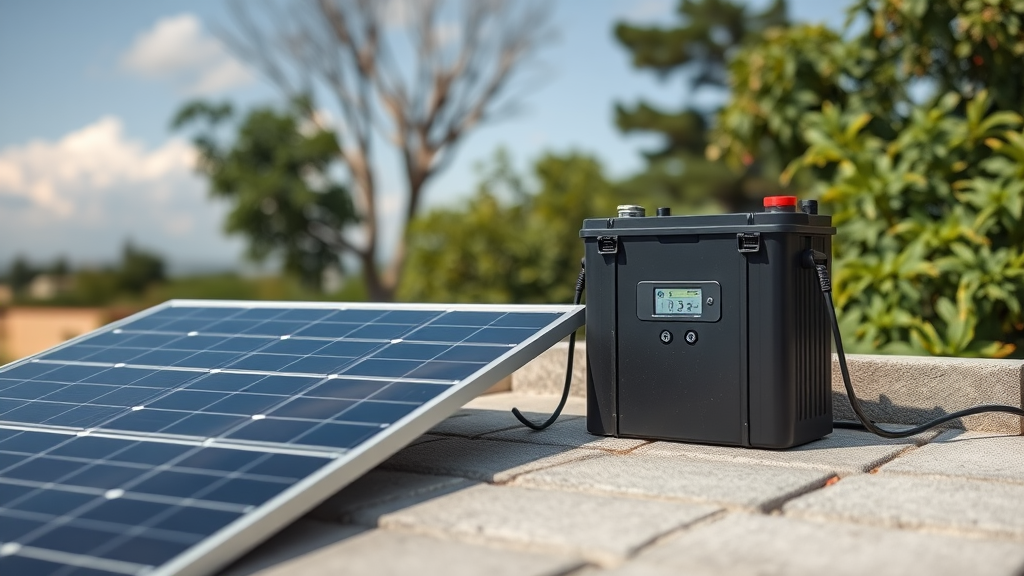Physical Address
304 North Cardinal St.
Dorchester Center, MA 02124
Physical Address
304 North Cardinal St.
Dorchester Center, MA 02124
Explore solar panel charge 48v battery
with this comprehensive guide.

When it comes to powering off-grid systems and renewable energy setups, efficiently charging a 48V battery using solar panels requires careful planning and understanding of electrical configurations. Modern solar energy enthusiasts recognize that 48V battery systems offer significant advantages in storing and managing larger energy capacities compared to lower voltage alternatives.
Successfully charging a 48V battery involves several critical components:
To efficiently charge a 48V battery, you’ll need to strategically connect solar panels. Typically, this involves series and parallel connections to achieve the desired voltage and current requirements. Most solar panel systems use multiple panels connected in series to generate the necessary 48V input.
| Panel Type | Voltage Range | Recommended Usage |
|---|---|---|
| Monocrystalline | 36-40V | High efficiency for 48V systems |
| Polycrystalline | 34-38V | Cost-effective option |
A robust charge controller is crucial in managing the energy transfer between solar panels and 48V batteries. MPPT (Maximum Power Point Tracking) controllers are recommended for their superior efficiency, typically converting 10-30% more energy compared to traditional PWM controllers.
Check out one of the top rated batteries & inverters here – https://www.healthrefreshed.com/charge-controllers-inverters
Proper wiring is paramount in 48V solar charging systems. Use high-quality, thick copper cables rated for solar applications to minimize resistance and power loss. Connections should be secure and protected against environmental factors.
To maximize solar panel charging efficiency for 48V batteries, consider these advanced strategies:
Regular system inspections are crucial. Check connections, monitor battery health, and ensure all components operate within manufacturer specifications. Implement protective measures like circuit breakers and grounding systems to prevent electrical hazards.
Solar panel charging for 48V batteries might encounter challenges such as:
Check out one of the top rated batteries & inverters here – https://www.healthrefreshed.com/charge-controllers-inverters
By understanding these nuanced aspects of solar panel charging for 48V battery systems, you can design a robust, efficient renewable energy solution tailored to your specific power requirements.
Solar energy has revolutionized how we power batteries, particularly in 48V battery systems that are becoming increasingly popular across residential and commercial applications. Understanding the intricate process of charging these batteries using solar panels requires comprehensive knowledge of technological integration and energy management.
Modern solar panel configurations can efficiently charge 48V battery banks by utilizing specialized charge controllers and advanced power conversion techniques. These systems leverage photovoltaic technology to transform sunlight into electrical energy, ensuring optimal battery performance and longevity.
Several critical factors influence the charging efficiency of 48V battery systems. Panel orientation, solar irradiance, temperature, and system design play pivotal roles in determining overall power generation and storage capabilities.
Check out one of the top rated batteries & inverters here – https://www.healthrefreshed.com/charge-controllers-inverters
| Efficiency Parameter | Impact Level |
|---|---|
| Panel Angle | High |
| Temperature | Medium |
| Shading | Critical |
When integrating solar panels with 48V battery systems, understanding voltage dynamics becomes crucial. Typical charging processes require precise voltage regulation to prevent overcharging and potential battery damage. Most professional systems employ sophisticated charge controllers that modulate incoming solar energy to match battery specifications.
Implementing multi-stage charging protocols ensures maximum battery health and performance. These strategies typically include:
Selecting appropriate solar panel wattage and configuration is essential for efficient 48V battery charging. Professionals recommend calculating total energy requirements and designing systems with 20-30% additional capacity to accommodate variations in solar input.
Contemporary solar charging systems integrate sophisticated monitoring platforms that provide real-time data on battery status, charging rates, and system performance. These technologies enable users to optimize energy management and preemptively address potential issues.
Check out one of the top rated batteries & inverters here – https://www.healthrefreshed.com/charge-controllers-inverters
Recommended resources for further exploration:
As renewable energy technologies continue evolving, solar panel charging for 48V battery systems represents a sophisticated and increasingly accessible solution for sustainable power generation. By understanding technical nuances and implementing strategic design principles, users can maximize their solar energy potential.
Harnessing solar energy to charge 48V battery systems represents a transformative approach to sustainable power management. The advancements in solar panel technologies and charging methodologies have revolutionized how we store and utilize renewable energy, providing reliable and efficient solutions for both residential and commercial applications.
Solar power integration offers multiple benefits beyond simple energy generation. By carefully selecting appropriate solar panels, charge controllers, and implementing strategic charging techniques, users can maximize battery performance, extend battery life, and reduce overall energy costs. The synergy between solar panels and 48V battery systems demonstrates a compelling pathway toward more intelligent and environmentally responsible energy consumption.
Technological innovations continue to drive improvements in solar charging efficiency, making these systems increasingly accessible and cost-effective. As renewable energy becomes more critical in addressing global environmental challenges, investing in robust solar charging infrastructure for 48V battery systems emerges as a forward-thinking strategy.
Check out one of the top rated batteries & inverters here – https://www.healthrefreshed.com/charge-controllers-inverters
Professionals and homeowners alike can leverage these solar charging techniques to create resilient, sustainable power solutions. The ability to effectively charge and manage 48V batteries through solar panels not only reduces carbon footprints but also provides energy independence and reliability in diverse settings.
The future of energy management lies in intelligent, adaptable systems that prioritize renewable resources. Solar panel charging for 48V batteries represents a significant step toward this vision, offering a practical, scalable, and environmentally conscious approach to meeting our growing energy needs.
By embracing these technologies and understanding their potential, individuals and organizations can contribute to a more sustainable energy landscape while enjoying the practical benefits of advanced solar charging solutions.